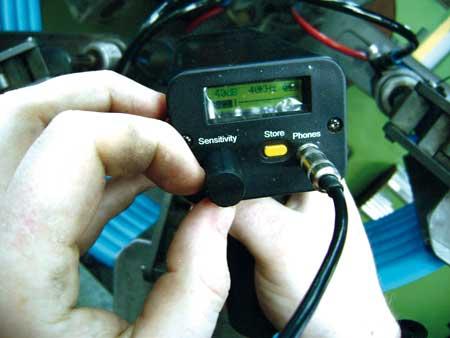|
COMPRESSED air is often viewed as a fixed part of the infrastructure of a manufacturing business and overlooked as an opportunity for savings. But the production of compressed air is energy intensive and can make up a significant proportion of a site’s electricity usage and costs. Large savings are often very realisable.
The Electricity Commission estimates electricity savings of 230 GWh per annum can be achieved by improving compressed air systems (CAS) – enough electricity to run 25,000 homes for a year. Not having to generate that amount of electricity would also reduce carbon emissions by 46,000 tonnes per year.
To help industry identify and capitalise on the electricity savings opportunities, the Commission is offering fully-funded audits as part of a world-leading CAS auditing initiative.
The Commission facilitates the efficient use of electricity by funding programmes that can overcome barriers to cost-effective electricity efficiency investment. Through the CAS Efficiency Programme, it aims to improve the electricity efficiency of New Zealand’s larger users of compressed air.
The Commission funds audits performed by an accredited CAS auditor for sites with over 75 kW of (operating) compressor capacity. The auditor will identify efficiency opportunities and recommend cost-effective actions to capture the savings.
The audits have a ‘total system’ focus. That is, they consider design and operational efficiencies of the supply and demand sides of the compressed-air equation. Ways of reducing compressor power consumption and annual energy cost (without adversely affecting operation) are investigated, quantified and presented in a report.
Initially, no financial commitment is required. The programme provides for an initial ‘walk-through assessment’ of a company’s compressed air system and, if good potential savings are identified, a more detailed ‘in-depth audit’ is offered.
Prior to proceeding with the funded in-depth audit, the Commission seeks agreement that the company concerned will action (reasonable) recommendations from the audit, where the pay-back period for the cost of improvement is two years or less.
“Producing compressed air uses significant amounts of energy and the audits we’ve completed to this stage have identified long-term electricity savings of up to 30 percent with payback periods of less than two years,” says accredited CAS auditor, Andy Logue.
CAS Programme successes
138 walk-through assessments have identified, on average, electricity savings of 30 percent.
Most savings have been identified in air leakages and other sources of ‘artificial air demand’ and in controlling multiple-compressor systems to work in a coordinated efficient manner.
Nelson Pine Industries is just one of the success stories from the programme. To date, savings of $90,000 per annum have been obtained as a result of an in-depth CAS audit and follow-up actions. The estimated one-off cost of achieving that result is $150,000.
Chief mechanical engineer for Nelson Pine Industries, Johannes Tamarua is very pleased to be part of the Commission's CAS Programme. “The in-depth audit proved a very valuable exercise for Nelson Pine. It identified a number of improvements – some that we have already implemented and others we are still working on. The actual results are even better than we anticipated,” says Tamarua.
Accredited CAS Auditors
Andrew Drummond of Wellington-based Atlas Copco recently became New Zealand's latest Accredited CAS Auditor.
“I'm excited to have gained formal recognition of my CAS auditing skills. The Electricity Commission's Auditing Guidelines and Standards focus strongly on a 'total system' approach to CAS auditing and analysis. Atlas Copco shares this approach,” says Drummond.
The country now has three accredited CAS auditors: Robert Norriss (Christchurch); Andy Logue (Auckland); and Andrew Drummond (Wellington).
To be accredited under the CAS Auditor Accreditation Scheme, an auditor must satisfactorily complete a CAS education course provided by the University of Waikato, and then demonstrate practical expertise in CAS auditing using the CAS auditing standards and guidelines provided and maintained by the Commission and the Compressed Air Association of Australasia (CAAA). The Commission and the CAAA maintain the ongoing integrity and relevance of the CAS auditing standards and guidelines under a ‘deed of participation’.
|
Julia Beck, project director for the CAAA said New Zealand was leading the world by helping large manufacturers become aware of the savings that can be achieved quite easily and often with a payback of less than two years.
“Nowhere else in the world has advanced to the stage that New Zealand has achieved and there is every reason for the New Zealand model to be picked up worldwide. We are also engaging in the development of an ISO standard for the auditing, which will improve the programme’s international appeal.”
In New Zealand, the accreditation of auditors is carried out by the Energy Management Association of New Zealand. Contact details of the accredited CAS auditors are available from www.compressedairaudit.org.nz. Contact your local auditor to arrange an initial ‘walk-through assessment’. Further information on the programme is also available from www.electricitycommission.govt.nz/opdev/elec-efficiency/programmes/industrial/cas.
Enquiries: Amanda Hunt amanda.hunt@electricitycommission.govt.nz
Programme Systems Co-ordinator
Electricity Commission
Level 7, ASB Bank Tower, 2 Hunter Street
P O Box 10041
Wellington
DDI: 04 471 8632
|






